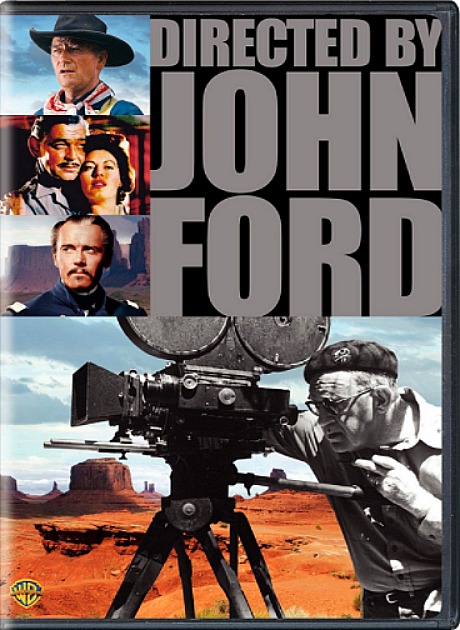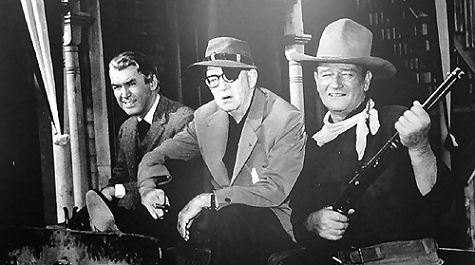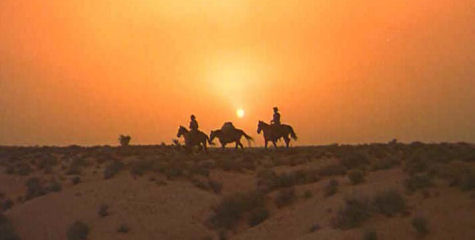Why isn’t a high-def version of Peter Bogdanovich‘s revised, expanded version of Directed by John Ford, which came out on DVD seven and a half years ago, streaming on Amazon or Netflix or wherever? One of the finest docs about a legendary director ever made and it’s still on DVD?
On 11.6.06 I posted an HE piece about Ford, called “Snarly Softie.” It was triggered by a viewing of Bogdanovich’s doc, which had its big debut on Turner Classic Movies in the spring of that year. The DVD popped two and a half years later, on 9.15.09.

That Ford piece I posted yesterday about his World War II service and more specifically his post-D-Day bender (which is mentioned in Netflix’s Five Came Back) led me back to the ’06 article:
“I’ve tried and it’s impossible — there’s no feeling just one way about John Ford. His movies have been wowing and infuriating me all my life, and after seeing Peter Bogdanovich‘s Directed by John Ford, the muddle is still there.
“But Bogdanovich’s film gives you a feeling — one that seems clear and genuine — that you’ve gotten to know the old coot better than ever before, that you’ve really and truly seen past the bluster and the scowl and the cigar, beyond the scrappy Irish machismo and into some intimate realm. After many years of saying “Ford sure made some great films but what a snappy old prick he was,” I’ve finally come to like the guy. And I feel I owe Bogdanovich a debt for that.
“I tried to say this during my Monday afternoon phone chat with Bogdanovich. We spoke for 25 or 30 minutes. And I never quite said what I felt the film had taught me about Ford, which is that he was a shameless softie who used a snarly exterior manner to keep people from getting inside and discovering who he really was. But of course, his films made that pretty clear on their own.
“Directed by John Ford is really and truly one of Bogdanovich’s best films. It’s right up there with The Last Picture Show, They All Laughed, Targets, Saint Jack and Paper Moon.
“It reminds us once again that the director of The Grapes of Wrath, The Informer, How Green Was My Valley, She Wore a Yellow Ribbon, The Horse Soldiers, Drums Along the Mohawk and The Man Who Shot Libery Valance was a superb visual composer and one of Hollywood’s most economical story-tellers bar none.

“His films were always layered and understated with sub-currents that never flowed in one simple direction. His films always seemed fairly obvious and sometimes sentimental …at first. Then you’d watch them again and reconsider, and they always seemed to be about a lot more.
“Bogdanovich actually made Ford in 1971, but he was never very happy with that earlier version. The current version still has the Orson Welles narration and a trio of warm, hilarious, fascinating interviews with John Wayne, Henry Fonda and James Stewart. These three alone make the doc worth seeing. The interviews were shot in 35 mm and very carefully lit and framed. The fact that Wayne, Fonda and Stewart have all moved on to the next realm makes it all the more affecting.
“The additions include new interviews with Martin Scorsese, Clint Eastwood, Walter Hill and Steven Spielberg.
“The other big extra is an audio tape of a 1973 heart-to-heart between Ford, then lying on his deathbed, and his lifelong love interest Katharine Hepburn (they fell for each other during the making of Mary, Queen of Scots). At one point you can hear Ford tell her that he loves her. It’s the kind of thing a guy like Ford would only say knowing that the clock is ticking and he’d better spit it out while he can still breathe.
“I love Spielberg’s recollection about meeting Ford and being brusquely told how he’ll never be a decent director until he learns to frame landscapes without the horizon being dead center. I take pictures every day and I don’t think I’ll ever forget that lesson. I know I won’t.
“I’m still bothered by the phoniness and jacked-up sentiment in just about every one of Ford’s films. The Irish clannishness, the boozy male camaraderie, the relentless balladeering over the opening credits of 90% of his films, the old-school chauvinism, the racism, the thinly sketched women, the “gallery of supporting players bristling with tedious eccentricity” (as critic David Thomson put it in his Biographical Dictionary of Film) and so on.
“But I now feel that I’ve finally come to know and very much like Ford the man. Maybe some day the stuff that still irritates me about his films will cease; maybe not. But I know my attitude about the guy has definitely been altered by Bogdanovich’s film. I presume I’m not the only one, or at least that I won’t be after it airs tomorrow night.”

